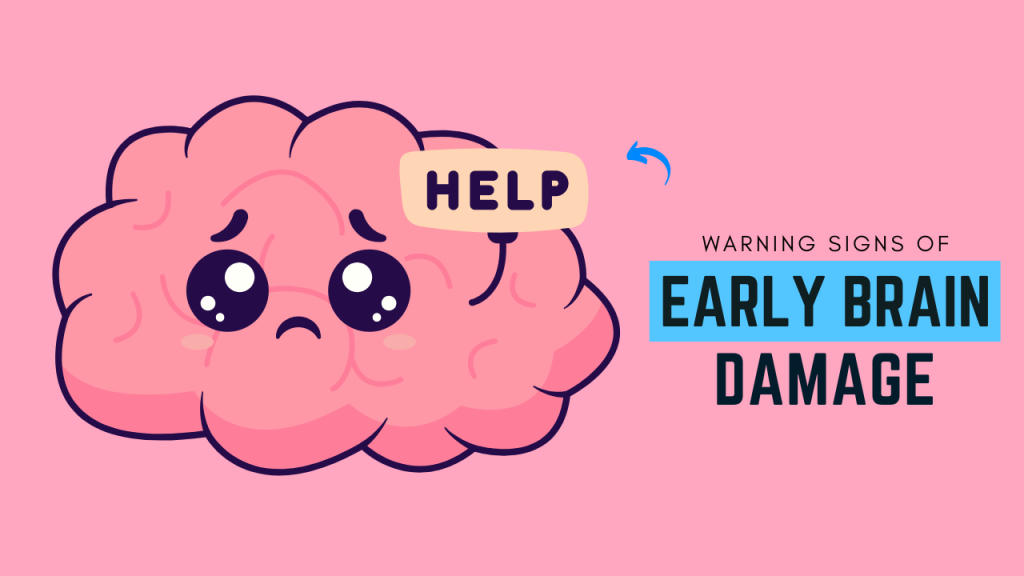Did you know that your brain can begin to suffer damage long before any medical diagnosis is made—often in ways that look like everyday forgetfulness or fatigue?
When we think of brain damage, we often picture dramatic events—trauma from accidents, strokes, or visible signs like slurred speech. But brain damage can begin subtly, creeping in without major alarms. These early warning signs are easy to overlook, yet they could be critical red flags your brain is sending out. Catching them early can make all the difference in protecting cognitive health and preventing long-term decline.

Do’s and Don’ts for Recognizing and Responding to Early Brain Damage
| Do’s | Don’ts |
|---|---|
| Pay attention to subtle changes in memory, mood, or coordination. | Ignore signs as just “aging” or “being tired.” |
| Seek medical advice early if symptoms persist. | Self-diagnose or delay professional evaluation. |
| Maintain a brain-healthy lifestyle: exercise, sleep, and nutrition. | Rely solely on supplements or internet remedies. |
| Keep a symptom journal to track changes over time. | Dismiss symptoms because they come and go. |
| Stimulate your brain with reading, puzzles, and learning. | Assume mental decline is inevitable or irreversible. |
| Stay socially connected and communicate concerns with loved ones. | Isolate yourself or hide symptoms out of fear. |
| Prioritize quality sleep and manage stress levels. | Overwork or neglect rest, thinking it won’t affect your brain. |
| Follow through with medical tests or therapy recommendations. | Skip follow-ups thinking you’re “feeling better.” |
What Is Early Brain Damage?
Early brain damage refers to subtle impairments in brain function that develop before severe symptoms manifest. These changes might result from:
- Mild traumatic brain injuries (like concussions)
- Chronic stress or sleep deprivation
- Poor circulation
- Early stages of neurodegenerative diseases (such as Alzheimer’s or Parkinson’s)
- Substance abuse or toxic exposure
- Undiagnosed metabolic or autoimmune conditions
Why Early Detection Matters
Your brain has an amazing ability to heal and rewire itself—but only if the problem is caught in time. Early intervention with medical treatment, nutrition, cognitive therapy, or lifestyle changes can slow or even reverse damage. Ignoring the early clues can lead to irreversible impairment.
1. Subtle Memory Changes

It’s normal to occasionally forget where you put your keys. But frequent lapses in short-term memory, like forgetting names of close acquaintances or repeating questions, can be a sign of early cognitive decline.
Myth Buster:
“Memory loss only happens to the elderly.”
False. Early memory changes can begin in your 30s or 40s and may signal deeper issues like brain inflammation or early-onset dementia.
2. Unusual Mood Swings or Irritability

Sudden emotional outbursts, chronic anxiety, or depression can be linked to early brain changes—especially in the frontal lobe and limbic system, which govern emotions and impulse control.
Did You Know?
A significant number of people diagnosed with Alzheimer’s report changes in mood years before memory problems become noticeable.
3. Clumsiness or Poor Coordination
Tripping often? Struggling to hold objects or bumping into things more than usual? The cerebellum, responsible for balance and coordination, may be showing early signs of impairment.
Tip: These signs are especially important after minor head injuries, even if you never lost consciousness.
4. Persistent Headaches or Migraines

Chronic headaches that don’t respond to typical treatments could be a sign of brain inflammation, circulatory issues, or even post-traumatic brain injury.
Important Note: If headaches are paired with nausea, vision changes, or confusion, seek medical attention immediately.
5. Sensitivity to Light and Sound

Increased sensitivity to sensory stimuli can indicate overstimulation of brain pathways—often seen in early neurological damage, concussions, or PTSD-related changes.
Interesting Fact:
People recovering from even mild brain injuries frequently report hypersensitivity as one of the earliest symptoms.
6. Difficulty Finding the Right Words
Struggling to complete sentences or pausing to recall common words can be an early sign of damage in the brain’s language centers.
Watch For: Mixing up similar-sounding words, relying on vague terms like “that thing,” or trailing off mid-sentence.
7. Sleep Pattern Disruptions
Insomnia, restless sleep, or unusual drowsiness during the day may indicate deeper neurological changes.
Did You Know?
Sleep is when your brain detoxifies and repairs itself. Chronic sleep loss can both cause and worsen brain damage over time.
8. Blurred Thinking and Brain Fog

Many people brush this off as being “tired” or “stressed,” but ongoing brain fog—difficulty concentrating, processing thoughts, or staying alert—shouldn’t be ignored.
Common Causes:
Hormonal imbalances, inflammation, early-stage neurodegeneration, or toxic exposure (such as mold or heavy metals).
9. Changes in Sense of Smell or Taste
A dulling of smell or taste—especially in the absence of a cold or sinus problem—can be an early indicator of neurological change.
Fun Fact:
Loss of smell is one of the earliest signs of Parkinson’s and has been linked to preclinical Alzheimer’s.
10. Visual Processing Problems
It’s not always about blurry vision. If you struggle to interpret spatial relationships, judge distances, or recognize familiar faces, your brain’s visual centers may be compromised.
Warning Sign:
Feeling disoriented in familiar environments or having trouble following fast-moving visuals, like traffic or scrolling text.
When to See a Doctor
If you or someone close to you is experiencing more than one of these symptoms persistently, it’s important to consult a neurologist or general physician. They may recommend cognitive tests, brain imaging, or lifestyle interventions.
Final Thoughts
Our brains rarely shut down without sending a distress signal first—but the early signs are often disguised as everyday struggles. Paying attention to subtle changes could protect your future self from irreversible damage.
Brain health isn’t just for the elderly or those recovering from injuries—it’s a lifelong priority. By catching these silent signals early, you can take powerful steps to heal, strengthen, and protect your brain for the years ahead.
Remember: Your brain is your most vital organ. Listen when it whispers—so you won’t have to act when it screams.
Frequently Asked Questions (FAQs)
Can early brain damage be reversed?
In some cases, yes. The brain has neuroplasticity, which means it can adapt and form new connections. Early intervention through proper treatment, cognitive therapy, lifestyle changes, and nutrition can slow down or even reverse some types of damage—especially if caught early.
What causes early brain damage in adults?
Common causes include mild traumatic brain injuries (like concussions), chronic stress, poor sleep, substance abuse, autoimmune disorders, infections, poor circulation, and early-onset neurodegenerative diseases.
How do I know if it’s just stress or something more serious?
If symptoms like memory issues, mood swings, or brain fog persist despite rest or lifestyle changes, or if they worsen over time, it’s worth getting evaluated by a healthcare provider. Chronic symptoms shouldn’t be dismissed as “just stress.”
Are these symptoms always a sign of brain damage?
Not necessarily. These signs can overlap with other conditions like vitamin deficiencies, anxiety, or thyroid disorders. However, they can indicate early brain dysfunction and should not be ignored if they’re persistent or worsening.
At what age can early brain damage begin?
Brain damage can occur at any age, depending on the cause. Even young adults in their 20s or 30s can show early signs, especially due to injuries, lifestyle factors, or environmental toxins.
Is memory loss a normal part of aging?
Mild forgetfulness can be normal with age, but significant memory lapses—like forgetting familiar names or directions—should be assessed. They could signal cognitive impairment rather than normal aging.
Can lifestyle changes really make a difference?
Yes. Regular exercise, quality sleep, brain-friendly nutrition (like omega-3s), mental stimulation, and stress management can greatly reduce your risk of cognitive decline and support brain healing.






Very good
Awesome
Awesome
Good